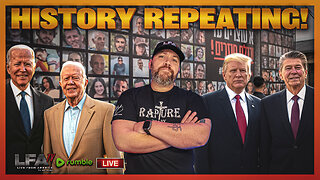Premium Only Content

Core Concepts Tanya: Chapter 30
Brief recap of Chapter 30:
1. Chapter 30 continues on the ideas introduced in the previous chapter, namely, that if a person isn't feeling spirituality, even though praying and doing mitzvot as he ought, then, like a log too thick to catch fire, he must break the barrier preventing the light from shining through. What is that barrier? Sin and indulgence in the material, the "blackout curtains" that block the light.
2. How is this barrier broken? Last chapter introduced "raging" at darkness, accusing it of denying the truth of the world. This chapter teaches that to feel spirituality, we have to make room for it by making our material selves smaller.
3. "Be lowly of spirit before every man."
There’s more than one level of humility.
One type is a feeling of inferiority in comparison to others.
A second is the absence of self-glorification, even in recognizing superior abilities. This is the humility Moshe was known for. He didn't belittle himself as a leader of the Jewish people and all that he did, but was humble in believing that his greatness came from Hashem. Just as Hashem had made him great through the qualities he was given, Hashem could also make another man great, even greater, with those same qualities.
4. This chapter focuses on the first kind of humility, which puts us in our place and reminds us that we are no better than anyone else. Remember, we're doing this to break the sense of self, the ego, which takes up so much space, it doesn't allow G-dliness in.
"Don't judge your fellow until you have stood in his place." We usually understand this to mean that we shouldn't judge someone unless we can fully understand their circumstances. However, Tanya goes a step beyond this. It could be man's place, as in his physical surroundings that lead him to sin. This person may have to deal with certain kinds of people in business, or walk certain streets or sit on certain corners, and we don't know what sort of temptation he's up against. It's easy for a scholar at home all day to condemn others for their behaviors, but he's safe inside while they're out there in the world. He's in no place to judge them, because he doesn't understand what they have to face.
5. Building on this, the Alter Rebbe teaches that the "evil inclination is not equal in every man." The verse is so important because it reminds us that we do not all face the same temptations, nor are we all equipped to fight each temptation in the same way. What might be easily overcome for one person may take every ounce of effort from another. Even though everyone is responsible for their actions, Hashem judges each in context of the life, circumstances, and character He's given us.
6. Considering the above, we now take another look at ourselves, as a "master of accounts," of where we really stand. Are we really inferior to the most lowly of individuals? If someone's just counting mitzvot then maybe not, but we have to dig deeper than that. This "lowly person" may very well be putting all their strength into fighting temptation, even if he fails, he still tried with everything that he had. Can someone seemingly above him say the same? Either in regard to fighting his own "relatively minor" temptations or in his effort to do good? Objectively, "turning from evil" and "do good" are equally vital because BOTH ARE THE WILL OF HASHEM. How much effort are we putting into either?
7. The Alter Rebbe lists numerous ways in which a Beinoni, or someone who seems to be doing all right, may be either negligent or may not put effort into fighting. Can this person honestly say that every bracha he makes is with full concentration and intention? That he walks away from any words that might even hint at slander or might discredit someone else? Does he give tzedakah joyously, as much as he should, and with an open hand? Does he treat Torah study as a business, in that he doesn't allow interruptions and gives his learning his full attention? Does he try and work and sweat to be more than what he is naturally inclined to be?
8. This chapter focuses on two important ideas:
(A). We need to make our material/physical selves smaller if we are to feel holiness and G-dliness and make space for it in our lives.
(B). To make our selves smaller, we need to humble ourselves by reminding ourselves that we have no place and no cause to feel greater than anyone else. We each have our own struggles and challenges, and our strengths and capabilities are not the same as anyone else's. Even if we think we're doing a good enough job at not transgressing, there's still infinite levels of doing good to tackle.
The bottom line is that we can always be more, and someone who's always striving and learning and bettering himself is someone who recognizes how small he is before the infinite.
-
 LIVE
LIVE
The Dana Show with Dana Loesch
1 hour agoWORST FAREWELL SPEECH IN HISTORY | The Dana Show LIVE On Rumble!
729 watching -
 LIVE
LIVE
TheAlecLaceShow
3 hours agoGuests: Senator Steve Daines & FBI Whistleblower Steve Friend | Biden Farewell | The Alec Lace Show
155 watching -
 1:00:12
1:00:12
The Dan Bongino Show
3 hours agoBiden Is Destroying The Country On His Way Out (Ep. 2402) - 01/16/2025
445K842 -
 2:14:50
2:14:50
Steven Crowder
4 hours agoCeasefire in Gaza: How Trump's Influence Has Already Transformed the World
266K125 -
 2:03:50
2:03:50
LFA TV
18 hours agoTRUMP GETS THE CREDIT! | LIVE FROM AMERICA 1.16.25 11am
29.2K13 -

Grant Stinchfield
1 hour agoBig Pharma Advertising Has Nothing to do With Selling Drugs... Instead It's a Pay Off!
96 -
 LIVE
LIVE
The Shannon Joy Show
4 hours ago🔥🔥Medical Kidnap In TEXAS! Mom Rachelle Suzanne: Medical City Hospital Persecuting Her Unvaccinated Son! 🔥🔥
428 watching -
 57:55
57:55
The Rubin Report
2 hours agoThe Unexpected Details of the Israel-Hamas Ceasefire & Who Should Take Credit?
60.6K26 -
 DVR
DVR
Benny Johnson
3 hours ago🚨 WATCH Pam Bondi BREAK Adam Schiff like a Pencil | Trump Confirmations Are On FIRE
77.1K50 -
 2:21:20
2:21:20
Ron DeSantis
4 hours agoGovernor Ron DeSantis Makes an Announcement in Orlando
146K4